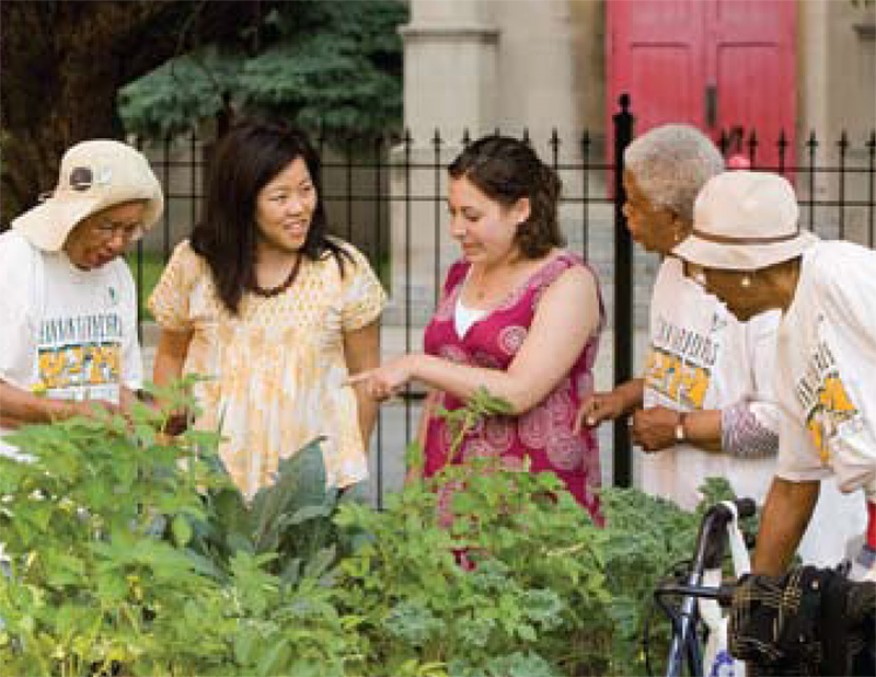Emily Farber and Sang Hee Novotny, MSW students in the geriatric program, wish to dispel misperceptions of gerontology.
“Gerontology can be fulfilling. You can learn a lot. It can be exciting and funny,” emphasizes Emily. “I plan to apply community organizing concepts to my work with older adults—for example, to consider nutrition or transportation solutions.”
The time could not be riper for more people to enter the field of gerontology, with people living longer and more active lives and with the aging of baby boomers.
It was the great need for gerontology social workers that induced Sang Hee to enter the geriatric social work program. She had worked for years in business in Silicon Valley, California, but felt unfulfilled in her job. Social work friends encouraged her to volunteer. “Once I got into the field and did research, I realized that the need is great for people to work with the aging population.”
Emily’s interest in gerontology began when she was in high school. She observed her father care for her grandmother, whose physical health was declining, and for her grandfather, who was struggling with Alzheimer’s. “I realized how important it is to have good, caring people to work with older adults, and I also saw the responsibilities of caregiving.”
The School’s gerontology program builds on grants from the National Institute of Aging, the John A. Hartford Foundation, and the McGregor Fund of Detroit. With these seed monies, the School has developed an ongoing scholars program for students like Emily and Sang Hee. Excellent faculty members, coupled with talented students in the MSW and Joint Doctoral programs, provide a strong foundation for the program.
Thirty-two students entered the U-M SSW geriatrics program in fall 2007 compared to 136 in children, youth, and families; 69 in mental health; 60 in community and social systems; and 36 in health.
Emily and Sang Hee are interning this summer at Hannan House, a multi-tenant nonprofit center in Detroit that includes Luella Hannan Memorial Foundation offices and programs. Seniors come from around the area to take a variety of classes—from art to exercise to gardening.
Sang Hee works on case management at Hannan House, where she makes referrals, provides resources, and does in-home assessments. She is also evaluating a pilot program of a nutrition lunch project with Gleaners Community Food Bank in which high school students prepare and deliver lunches to schools and to a senior living home. “My field placements have been most exciting, most challenging, and the area in which I have benefited the most at U-M,” she reflects.
Through her placement, Emily is collaborating with many organizations on Detroit Griot (which means “West African storyteller”), an oral history initiative in which seniors record their stories. She is also working on a community vegetable garden at Hannan House and seeks to expand the idea to senior living facilities.
“Hannan House is so much more than a senior center,” Emily says. Sang Hee agrees. “It really brings the community together. I feel that the city of Detroit has a bad reputation, but what I see every Tuesday through Friday is not what everyone reads in the newspapers or watches on television.”
Professor Ruth Dunkle acts as treasurer for the Luella Hannan Memorial Foundation. She is also secretary for the Board of Trustees and serves as chairperson for the Program Committee. “Hannan is a unique organization serving seniors in Detroit,” she says. “The staff members conduct programs within Hannan House but also organize programs throughout Detroit for seniors. Our geriatric scholars who have had the opportunity to work here have learned quite a bit about the service delivery climate for seniors in Detroit and have given a tremendous amount to the community through their work in their internships.”
Neither Emily nor Sang Hee have regretted entering the geriatric program. “I’m surprised by my clients all the time, by their strengths,” Sang Hee says.
“The people we work with prove that geriatrics is not boring,” Emily concurs. “They tell me about their travels, extended families, volunteer activities, and relationships. It’s a daily reminder not to write off older adults.”
—Tanya C. Hart Emley is editor of Ongoing.
